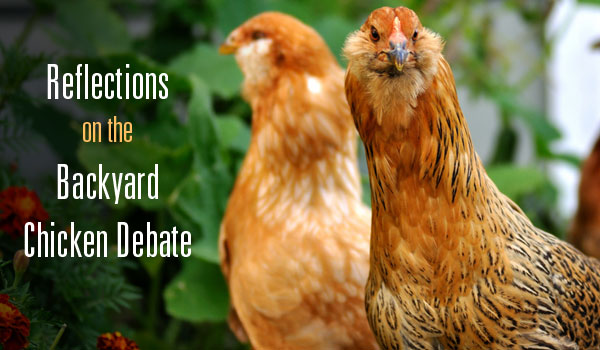Reflections on Backyard Chickens
 Cary, NC — Backyard chickens crossed the road to legality about a year ago in Cary after years of discussion and debate among citizens and Town Council members. Pro and anti-chicken “special interests”—as Mayor Weinbrecht called them—ruffled quite a few feathers as they lobbied for and against Cary residents’ right to keep hens for eggs and companionship.
Cary, NC — Backyard chickens crossed the road to legality about a year ago in Cary after years of discussion and debate among citizens and Town Council members. Pro and anti-chicken “special interests”—as Mayor Weinbrecht called them—ruffled quite a few feathers as they lobbied for and against Cary residents’ right to keep hens for eggs and companionship.
Reflections on Backyard Chickens
At the height of this squabble, I was a loyal member of the pro-poultry party, having experienced the pleasures of hen keeping while living in Carrboro for several months.
I had enjoyed watching the lovely, delightfully awkward ladies shuffle around the yard– scratching, pecking, and even swinging on the hammock. Each had a unique personality and her own peculiar tendencies: only one was bold enough to try stealing some oatmeal straight out of my bowl every morning. To me, the company of backyard chickens was more rewarding than the eggs themselves, although I did appreciate the fresh frittatas. I also reveled in the chance to eat these happy hens’ eggs with a clear conscience, knowing that I was not supporting the cruel and environmentally-destructive practice of factory farming.
My opinions about backyard chickens have changed since then, and I now regret supporting the pro-chicken lobby. Although I sympathize with some of the main sentiments expressed by the anti-chicken crowd (the birds can be quite loud and, sometimes, a little smelly), my reasons for now opposing this local movement are somewhat unique.
I did a little research and was appalled by some aspects of this practice that, on the surface, could not appear more wholesome. It turns out that backyard chickens are not as far removed from the horrors of factory farming as I thought. Almost all chicks—whether they are sold to your neighbor down the street or to “farmers” who cram over 100,000 birds in one building—come from industrial hatcheries, where newly-hatched chicks are sorted and handled like parts in a factory. The female chicks are stuffed into boxes—sometimes remaining there for days—and shipped across the country. Many die of dehydration, starvation, or rough handling.
All Cluck and No Action
But the male chicks meet a much worse fate. Because roosters are all cluck and no (egg-laying) action, they are banned by most municipalities, including Cary. The industry sees them as useless byproducts. Less than a day old, male chicks are either thrown into trash bags to suffocate or tossed into a meat grinder to be ground up alive. Watch here if you don’t believe me… and if you think you can stomach it.
I found out that many of the lucky hens who make it to backyards may not get to experience that carefree, bug-catching, ground-scratching life for long. Visibly shaken, my former housemate told me one day that she had followed a trail of bloody feathers to what remained of one of our sweet hens. Even the most vigilant chicken keepers can’t fully protect their birds from hungry predators.
People also realize that hens often require far more work than cats and dogs, and can be quite expensive, too. Sick chickens need veterinary care just like pets do, but specialized treatment can be costly and difficult to find in urban areas. Hens stop laying eggs years (sometimes even a decade!) before they die of old age, which means chicken keepers end up paying hundreds of dollars to feed and care for hens with zero “output.”
Disillusioned
Disillusioned keepers of backyard chickens—or those who move to chicken-unfriendly towns—end up in quite a predicament: what to do with expensive, unwanted birds? Most cities and towns do not allow the backyard slaughter of chickens, and places like Cary are unlikely to ever permit this practice. Most people can’t bring themselves to kill their “pets” anyway.
Predictably, animal shelters and sanctuaries across the country are now receiving thousands of ex-backyard chickens. Most are not equipped to handle the birds, and almost all are already full-to-bursting with homeless dogs and cats. The backyard chicken fad has resulted in an unintended crisis, and shelters are scrambling to find the hens new homes.
Thankfully, most Homeowner Associations in Cary still don’t allow backyard hens. If yours does (or you don’t have an HOA), think twice about getting chickens. For every hen you buy a male chick will die, and keeping the hens alive isn’t easy. Plus, eggs aren’t all they’re cracked up to be – they’re loaded with artery-clogging cholesterol.
As for me, I’ll be sticking with oatmeal for breakfast.
——————————————————————————————–
Opinion by Jamie Berger, summer editorial intern for CaryCitizen. Photo by Will Merydith.



I’m assuming that you are vegan? Can you really not respect the choices of non-vegans to want eggs from happy chickens? 2 of our hens were actually purchased from local breeders, and the males from their program are also sold as breeding chickens (it’s a rare breed). Also, no matter how nice you are to male chickens, if you have a 50/50 gender ratio of adult chickens, the males fight each other (to death, if they can). Roosters are also basically rapists, and it’s cruel to the hens to have more than 1 rooster per about 5-10 hens.
Regarding the shelter issue, unless you are also of the opinion that no one should keep any pets, ever, because they might someday abandon them because they are irresponsible people, then I don’t get the point. We don’t ban other pets because someone, somewhere, might be irresponsible. Additionally, chickens are food. If people are unwilling to keep their hens into retirement, then they need to eat them (slaughter outside of cary) or give them to someone who will eat them. Even if they are eaten, they still had a happy hen life for as long as it lasted. That is all I expect of my food. That carrot was happy before I made it into soup too. The NBC article you link to is essentially PETA propaganda–if there are so many spare chickens, we should be slaughtering them and providing them to food-insecure people.
Dietary cholesterol is also not unhealthy at reasonable levels and does not raise cholesterol to unhealthy levels, and eggs have a beneficial effect on cholesterol levels: http://www.ncbi.nlm.nih.gov/pubmed/16340654 (and many many other articles). Cholesterol and its actual impact (or lack thereof) on heart disease is actually an interesting area of research–but the take away is that it’s not the horrible thing we thought it was back in the 1980s.
Jamie, I appreciate the honesty of your article, “It turns out that backyard chickens are not as far removed from the horrors of factory farming as I thought.”
Oftentimes, many of us, including me, think we are helping others by preaching truths. In reality, we merely regurgitate the misinformation (perhaps disinformation?) without delving any further.
After reading this article I am sad for all chickens now.Kept or unkept they lead a life with not much promise.Makes me really want to go vegetarian,seriously.